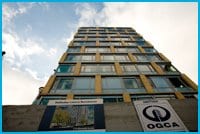While a queers-only seniors home appears to be just a pipe dream, a new facility opening this year will offer much-needed spaces to the community.
Wellesley Central Residences — being built on the site of the former Wellesley Hospital at 490 Sherbourne St — is a joint supportive housing project between Woodgreen Community Services and Fife House, which supplies housing for people living with HIV and AIDS. The facility, scheduled to open this summer, will be a 112-unit building to be split equally between people living with HIV/AIDS (PHAs) and seniors. All units will be aimed at lower-income residents who need supportive living facilities.
Brian Smith, the president of Woodgreen, says the facility — because it is being funded by all three levels of government — cannot legally have a queers-only policy. But he says that queer seniors will be given first crack.
“We want to make our first outreach to the LGBT community,” says Smith. “Those who want to can put their name in before we go to the wider community. Our second outreach is to the wider community if we don’t get enough people. We can only try through marketing to give the first opportunity to the LGBT community.”
The residence will also contain the new main office of Fife House. Fife House currently operates three houses and an apartment building in Toronto, housing a total of 122 people. All Fife House’s spaces are aimed at lower income residents and the organization’s Homeless Outreach Program helped find affordable housing for another 303 people in 2007.
“The need for affordable supportive housing is just as strong today as it was 20 years ago” when Fife House started, says Keith Hambly, the organization’s executive director. “Recently the Ontario Advisory Committee on HIV/AIDS identified affordable housing as the most urgent unmet need facing PHAs. In Toronto today there are approximately 16,000 to 18,000 PHAs and yet there are only 131 supportive housing units available for these people.
“Fife House provides 75 percent of all the supportive housing for PHAs in Toronto and this year, for the first time in a decade, we will be adding to that number when we open our new building. This will represent a 35 percent increase in the number of affordable supportive housing spaces.”
The 56 units for seniors will be open to those who require some help but not 24-hour care.
“The residence will be open to those 55 or older who require some assistance to live independently,” says Smith.
The new residence will add to spaces for queers available in supportive senior housing operated by the City of Toronto. The city’s Homes for the Aged program operates 10 supportive housing facilities across the city. Of those, Fudger House on Sherbourne St and Kipling Acres in Etobicoke have rooms set aside for queer seniors.
“The approach we’ve taken is to do diversity training,” says Sandra Pitters, the general manager of Homes for the Aged. “We’ve tended to partner with community groups.”
But Dick Moore, the coordinator of the Older LGBT Program at the 519 Community Centre, thinks the queer community needs to start fundraising to create its own housing. Moore, who works with Homes for the Aged, says the need is growing.
“The queer community is significant enough in size to merit a home,” he says. “There is a need in the community for sure and as the community gets older it’s going to be more of a need.
“A lot of lesbian seniors are poor, much poorer than their straight sisters. The trans community, that’s a community that’s in particularly desperate need of respectful care.”
Moore points to supportive housing facilities that have been created by various ethnic communities in the city. Because those facilities receive government funding for their beds, they have to take residents from outside their community. But Moore says they were built with funds from their community and cater largely to that community.
Moore says he would also support a queers-only home, but he says efforts to build one have failed. Such a facility would have to be completely privately funded.
Michael Stewart, who tried in 2004 to build a private seniors’ home, says he was unable to find the financial support within the community.
“By not taking one cent from any level of government we could discriminate,” he says. “But apathy I would say was at 90 percent.”
Stewart says it would have been necessary to raise an initial $1 million to institute a fundraising program through investment in government bonds.


 Why you can trust Xtra
Why you can trust Xtra


